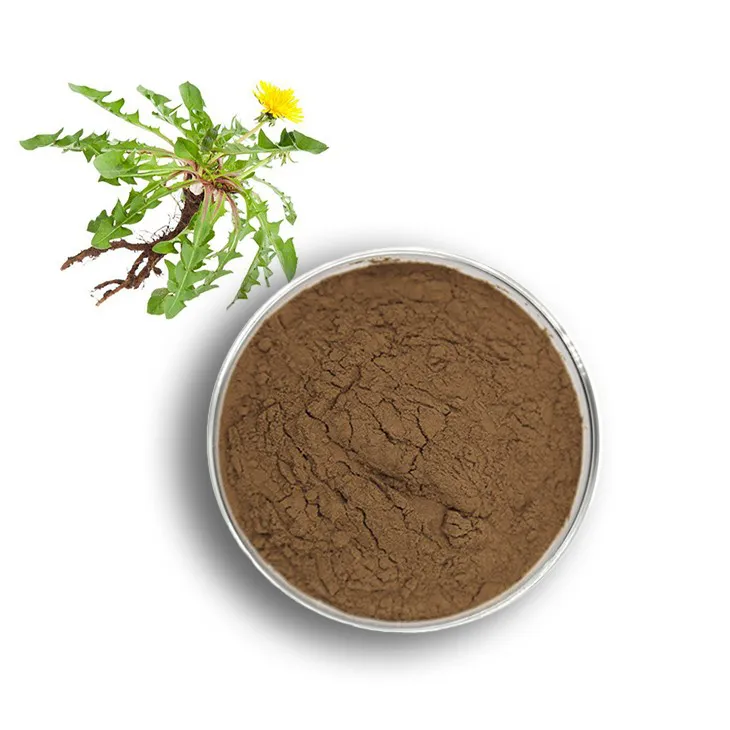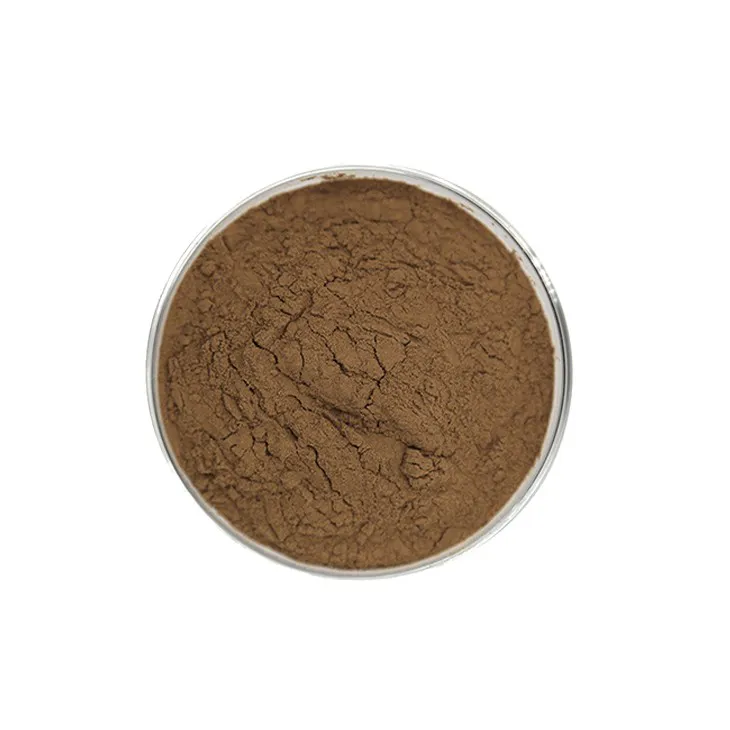- 0086-571-85302990
- sales@greenskybio.com
5 Great Reasons for Using Dandelion Root Extract in the Food Industry.
2024-12-18

1. Anti - inflammatory Properties
Dandelion Root Extract has been recognized for its potential anti - inflammatory properties, which is one of the significant reasons for its use in the food industry. Inflammation is a natural response of the body's immune system, but chronic inflammation can lead to various health problems. By incorporating Dandelion Root Extract into food products, these anti - inflammatory benefits can be transferred to consumers.
Many modern diets are rich in processed foods that may contribute to inflammation. For example, foods high in refined sugars, saturated fats, and artificial additives can trigger an inflammatory response in the body. Dandelion Root Extract, on the other hand, contains bioactive compounds such as polyphenols and flavonoids. These compounds have been studied for their ability to modulate the body's inflammatory pathways.
When added to food products like beverages, yogurts, or even baked goods, dandelion root extract can act as a natural anti - inflammatory agent. This is especially appealing to health - conscious consumers who are constantly seeking ways to reduce inflammation through their diet. For instance, a dandelion - root - extract - infused herbal tea can provide a soothing and potentially anti - inflammatory drink option.

2. Source of Dietary Fiber
Another advantage of using dandelion root extract in the food industry is that it serves as a source of dietary fiber when added to food. Dietary fiber is essential for maintaining good digestive health. It can be classified into soluble and insoluble fiber, both of which play crucial roles in the digestive process.
Soluble fiber in dandelion root extract can dissolve in water and form a gel - like substance in the digestive tract. This helps to slow down the digestion and absorption of carbohydrates, which can be beneficial for blood sugar control. It also binds to cholesterol in the gut, potentially reducing blood cholesterol levels.
Insoluble fiber, on the other hand, adds bulk to the stool, promoting regular bowel movements and preventing constipation. When dandelion root extract is incorporated into foods such as cereals, bars, or smoothies, it can increase the overall fiber content. This is especially important in today's diet, where many people do not consume enough fiber - rich foods. For example, a fiber - enhanced breakfast cereal with dandelion root extract can provide a convenient way for consumers to boost their daily fiber intake.

3. Natural Food Coloring Agent
Dandelion root extract offers its natural color as a valuable asset in the food industry, serving as a natural food coloring agent. In recent years, there has been a growing consumer preference for natural products, including natural food colorings. Synthetic food colorings have faced some criticism due to potential health concerns associated with certain additives.
The natural color of dandelion root extract can range from a light yellow to a deeper golden hue, depending on the extraction method and the concentration used. This natural color can be used to enhance the appearance of a variety of food products. For example, it can be used to color baked goods such as cakes and cookies, giving them a more appealing and natural - looking tint.
In addition to baked goods, dandelion root extract can also be used in beverages. A natural - colored lemonade or fruit juice with the addition of dandelion root extract can have a more vibrant and inviting appearance. This not only satisfies the consumers' desire for natural products but also gives food manufacturers an opportunity to differentiate their products in the market.

4. Flavor Profile Enhancement
Dandelion root extract has the ability to interact with other ingredients in food, which is a great advantage for improving the overall flavor profile. It has a unique and complex flavor profile of its own, which can add depth and complexity to various food products.
The flavor of dandelion root extract can be described as slightly bitter, earthy, and nutty. When used in combination with other ingredients, it can create a harmonious blend of flavors. For example, in a salad dressing, the bitterness of dandelion root extract can balance the sweetness of honey or the acidity of vinegar. In a savory dish like a stew or a soup, it can add an earthy undertone that complements the other flavors in the dish.
Moreover, it can also enhance the flavor of fermented products. In cheese - making, for instance, dandelion root extract can be added to the milk during the fermentation process. The unique flavor compounds in the extract can interact with the bacteria and enzymes involved in cheese - making, resulting in a cheese with a more interesting and complex flavor.
5. Environmentally Friendly Ingredient
As an environmentally friendly ingredient, dandelion root extract aligns with the sustainable development goals of the food industry. Dandelions are widely available and are often considered weeds. However, they can be sustainably harvested for the extraction of their roots.
Unlike some exotic or rare ingredients that require large - scale cultivation in specific regions or have a high environmental impact due to transportation and intensive farming practices, dandelions can be sourced locally in many areas. This reduces the carbon footprint associated with ingredient sourcing.
Additionally, the cultivation of dandelions does not typically require the use of large amounts of pesticides or fertilizers. They are relatively hardy plants that can grow in various soil conditions. This makes the production of dandelion root extract more environmentally sustainable compared to some other food ingredients. Food manufacturers that are committed to sustainability can use dandelion root extract as a way to promote their green initiatives and appeal to environmentally - conscious consumers.
FAQ:
What are the anti - inflammatory properties of dandelion root extract in the food industry?
Dandelion root extract contains certain compounds that have been associated with anti - inflammatory effects. When incorporated into food products, these properties can potentially reduce inflammation in the body of consumers who consume such products. However, more research is still needed to fully understand the extent and mechanism of these anti - inflammatory properties in the context of food consumption.
How does dandelion root extract act as a source of dietary fiber in food?
Dandelion root is rich in fiber. When it is made into an extract and added to food, it provides the additional dietary fiber content. This fiber can help in various ways such as promoting bowel regularity, preventing constipation, and may also contribute to a feeling of fullness, which can be beneficial for those looking to manage their weight or improve their digestive health.
Can dandelion root extract replace artificial food coloring agents completely?
While dandelion root extract can be used as a natural food coloring agent, it may not be able to completely replace artificial ones in all cases. Its natural color can add an appealing hue to certain foods, especially for those consumers who prefer natural ingredients. However, artificial coloring agents often have more stable colors and can be produced in larger quantities and with more consistent quality. But as the demand for natural products grows, dandelion root extract can be a great alternative in many food applications.
How does dandelion root extract improve the flavor profile of food?
Dandelion root extract can interact with other ingredients in food in different ways. It might enhance certain flavors, mask off - flavors, or add a unique and pleasant taste note. For example, it could complement the flavors of fruits in a smoothie or add an earthy undertone to a baked good. The exact flavor - enhancing effects depend on the type of food and the other ingredients present.
Why is dandelion root extract considered an environmentally friendly ingredient?
Dandelions are widespread plants that are relatively easy to cultivate. They require less resources such as water, pesticides, and fertilizers compared to some other crops used for food ingredients. Additionally, their growth can be sustainable as they are often native or well - adapted to local environments, reducing the carbon footprint associated with transporting ingredients over long distances.
Related literature
- The Potential of Dandelion (Taraxacum officinale) in the Food and Nutraceutical Industry"
- "Dandelion Root Extract: Properties and Applications in Food"
- "Sustainable Ingredients in the Food Industry: The Case of Dandelion Root Extract"
- ▶ Hesperidin
- ▶ citrus bioflavonoids
- ▶ plant extract
- ▶ lycopene
- ▶ Diosmin
- ▶ Grape seed extract
- ▶ Sea buckthorn Juice Powder
- ▶ Beetroot powder
- ▶ Hops Extract
- ▶ Artichoke Extract
- ▶ Reishi mushroom extract
- ▶ Astaxanthin
- ▶ Green Tea Extract
- ▶ Curcumin Extract
- ▶ Horse Chestnut Extract
- ▶ Other Problems
- ▶ Boswellia Serrata Extract
- ▶ Resveratrol Extract
- ▶ Marigold Extract
- ▶ Grape Leaf Extract
- ▶ blog3
- ▶ blog4
- ▶ blog5
-
Seven Trends of Nettle Leaf Extracts.
2024-12-18
-
Cranberry Extract
2024-12-18
-
Sophora Flavescens Root Extract
2024-12-18
-
Grape Seed Extract
2024-12-18
-
Ginseng Root Extract
2024-12-18
-
Sugarcane Extract
2024-12-18
-
melatonin extract
2024-12-18
-
Yohimbine Bark Extract
2024-12-18
-
Baicalin
2024-12-18
-
Chasteberry Extract
2024-12-18
-
Tamarind extract powder
2024-12-18





















